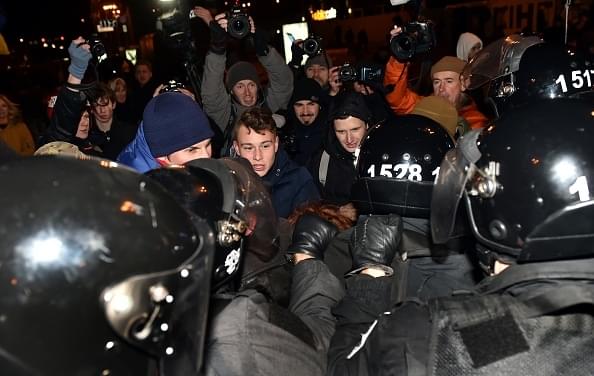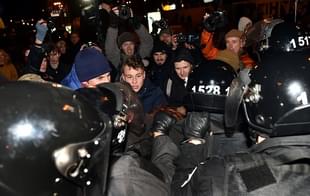World
Why American Support For Ukraine Will Not Help The Situation
Daniel DePetris
Dec 23, 2016, 03:53 PM | Updated 03:53 PM IST
Save & read from anywhere!
Bookmark stories for easy access on any device or the Swarajya app.


The first several months of a new administration are inevitably seen as an opening for those who hope to influence the White House over the next four years. The Senate Ukraine Caucus—a bipartisan group of senior lawmakers who have lobbied intensively for a closer US-Ukraine relationship—hopes to take advantage of this sensitive period, in which the new president will order policy reviews, modifications in existing programmes, or even a clean break from the past.
In a letter to President-elect Trump, the caucus writes that it is absolutely critical for the United States to enhance its support to Kiev at a time when Vladimir Putin’s Russia continues to support a separatist movement on Ukrainian soil. “Quite simply,” the group claims, “Russia has launched a military land-grab in Ukraine that is unprecedented in modern European history. These actions in Crimea and other areas of eastern Ukraine dangerously upend well-established diplomatic, legal, and security norms that the United States and its NATO allies painstakingly built over decades.”
On this score, the senators are correct. Russia’s stealth invasion, occupation, and annexation of the Crimean Peninsula was for all intents and purposes a land-grab denounced not only by the United States but by the United Nations as a violation of state sovereignty and self-determination.
But let’s not kid ourselves; this isn’t the first time a stronger power will attempt to change the borders of a weaker neighbour, nor will it be the last. The Russians saw an opportunity to immediately exploit the confusion of Ukraine’s post-Viktor Yanukovych period. Moscow’s signing of the Minsk accords, an agreement that was designed to de-escalate the violence in Eastern Ukraine through mutual demobilization of heavy weapons along the conflict line and a transfer of border control from separatist forces back to the Ukrainian government, has been stalled to the point of irrelevance.
It is incontrovertible that, were it not for Russia’s military support and intervention in the summer of 2014, the Ukrainian army would likely have been able to defeat the separatist units that were carving out autonomous “peoples’ republics” in the east—or at the very least, degrade rebel capabilities to such an extent that Kiev would be able to win more concessions at the negotiating table.
Yet while we should acknowledge Russia’s violations of international law and the UN Charter, US and European policymakers also need to recognise that Ukraine is far more important for Moscow’s geopolitical position than Washington’s.
There is a reason why Vladimir Putin made the fateful decision in 2014 to plunge Russian forces into Ukraine, and it wasn’t because he was itching for a war of preemption. He deployed Russian forces across the Ukrainian border—despite the whirlwind of international condemnation and the Western financial sanctions that were likely to accompany such a decision—because preserving a pro-Russia bent in the Ukraine body politic was just too important for Moscow’s regional position.
Grasping this reality in no way excuses Moscow’s behaviour. It merely explains why the Russian government acted the way it did, and why further US military assistance to the Ukrainian security forces would be ill-advised. In fact, one could make a convincing case that providing hundreds of millions of dollars in security assistance to the Ukrainian government wouldn’t help the situation at all, and might lead Kiev to delude itself into thinking that Washington will come to its immediate military aid in order to stabilise the battlefield.
Since 2015, the United States Congress has authorised $750 million to improve the defensive capabilities of the Ukrainian military and security forces. Congress has followed up those funds with an additional $650 million earmarked for the Ukrainians over the next two years, a hefty sum that the next administration would probably use as a message to the Russians that further territorial encroachment on Ukrainian territory would produce more casualties in their ranks.
What the next administration needs to ask itself, however, is whether more money thrown at the Ukraine problem will be more or less likely to cause further violence in the country and turmoil for Ukraine’s elected government. Russia has demonstrated consistently that it will simply not permit a pro-Western democratic government from emerging along its western border—and that if a pro-Western government is formed in Kiev, Moscow will do its best to preserve a pro-Russian bent in Ukraine’s eastern provinces. Hundreds of millions of dollars in appropriations haven’t forced Russia to change that calculation so far; it’s not likely that hundreds of millions more will be any more successful. Indeed, every time Washington has escalated its rhetoric or authorised money for Ukraine’s military, the Russians have responded in equal terms.
The political crisis in Ukraine is far from resolved, in large measure because of Russia’s own actions on the ground and its nonexistent implementation of the Minsk peace agreement. But the situation in the east, while not fully peaceful by any means, is far less violent than it was at the war’s peak in 2015. Sometimes, not weighing in can be just as smart for the US national interest as getting involved—a reflex that has been the forte of Washington’s foreign policy establishment since the end of the Cold War.
This piece was first published on The American Conservative and has been republished here with permission.
Daniel DePetris is a fellow at Defense Priorities.





